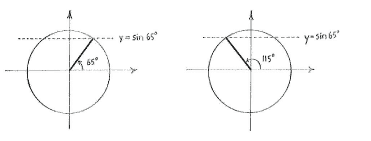Solution 4.4:3c
From Förberedande kurs i matematik 1
(Difference between revisions)
m |
|||
| Line 1: | Line 1: | ||
| - | If we consider the entire expression | + | If we consider the entire expression <math>x + 40^{\circ}</math> as an unknown, we have a basic trigonometric equation and can, with the aid of the unit circle, see that there are two solutions to the equation for <math>0^{\circ}\le x+40^{\circ}\le 360^{\circ}</math> namely <math>x+40^{\circ} = 65^{\circ}</math> and the symmetric solution <math>x + 40^{\circ} = 180^{\circ} - 65^{\circ} = 115^{\circ}\,</math>. |
| - | <math>x+ | + | |
| - | as an unknown, we have a | + | |
| - | <math>0^{\circ }\le x+ | + | |
| - | namely | + | |
| - | <math>x+ | + | |
| - | and the symmetric solution | + | |
| - | <math>x+ | + | |
| - | + | ||
[[Image:4_4_3_c.gif|center]] | [[Image:4_4_3_c.gif|center]] | ||
| - | It is then easy to set up the general solution by adding multiples of | + | It is then easy to set up the general solution by adding multiples of <math>360^{\circ}\,</math>, |
| - | <math>360^{\circ }</math>, | + | |
| - | + | ||
| - | + | ||
| - | + | ||
| - | + | ||
| - | + | ||
| - | + | ||
| - | + | {{Displayed math||<math>x + 40^{\circ} = 65^{\circ} + n\cdot 360^{\circ}\qquad\text{and}\qquad x + 40^{\circ} = 115^{\circ} + n\cdot 360^{\circ}</math>}} | |
| - | <math>n</math> | + | |
| + | for all integers ''n'', which gives | ||
| - | <math>x= | + | {{Displayed math||<math>x = 25^{\circ} + n\cdot 360^{\circ}\qquad\text{and}\qquad x=75^{\circ} + n\cdot 360^{\circ}\,\textrm{.}</math>}} |
| - | + | ||
| - | + | ||
Current revision
If we consider the entire expression \displaystyle x + 40^{\circ} as an unknown, we have a basic trigonometric equation and can, with the aid of the unit circle, see that there are two solutions to the equation for \displaystyle 0^{\circ}\le x+40^{\circ}\le 360^{\circ} namely \displaystyle x+40^{\circ} = 65^{\circ} and the symmetric solution \displaystyle x + 40^{\circ} = 180^{\circ} - 65^{\circ} = 115^{\circ}\,.
It is then easy to set up the general solution by adding multiples of \displaystyle 360^{\circ}\,,
| \displaystyle x + 40^{\circ} = 65^{\circ} + n\cdot 360^{\circ}\qquad\text{and}\qquad x + 40^{\circ} = 115^{\circ} + n\cdot 360^{\circ} |
for all integers n, which gives
| \displaystyle x = 25^{\circ} + n\cdot 360^{\circ}\qquad\text{and}\qquad x=75^{\circ} + n\cdot 360^{\circ}\,\textrm{.} |

